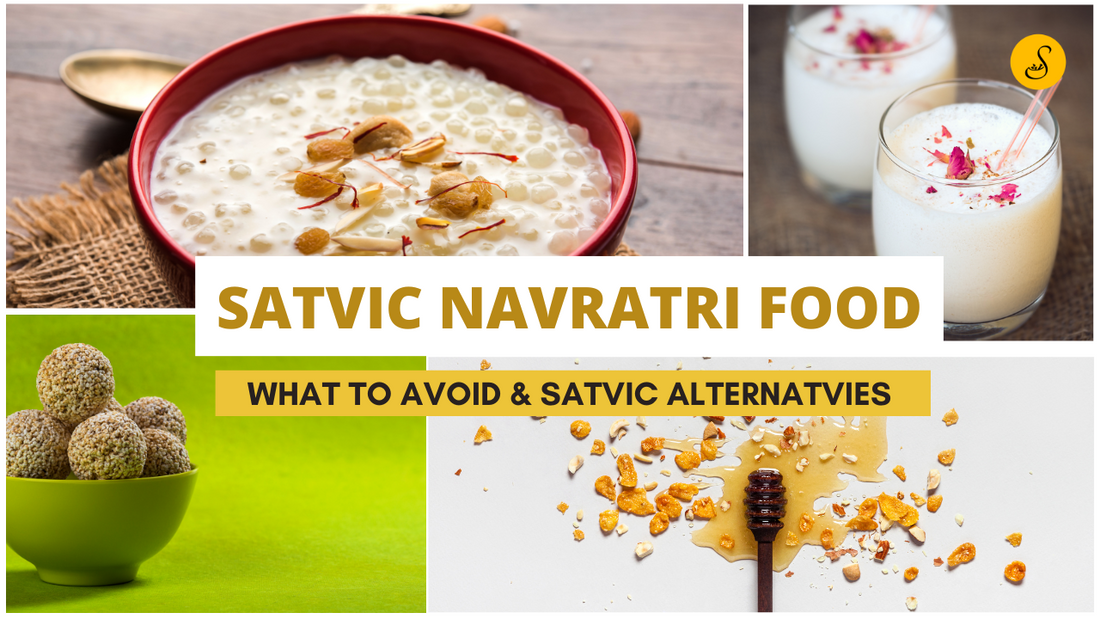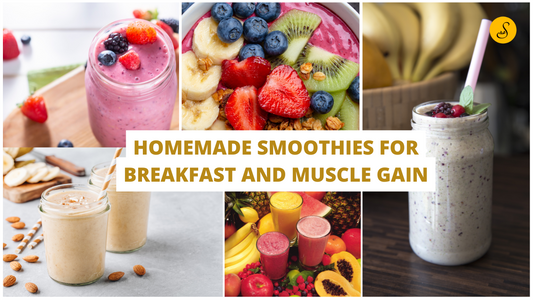10 Foods to Avoid During Navratri [2024]

Understanding which foods to avoid during Navratri 2024 is crucial to ensure the purity and sanctity of this sacred festival. Navratri is one of India’s most awaited and cherished celebrations, where devotees honor Maa Durga and her nine forms through their prayer, fasting, and other rituals. Fasting, mainly, is a very crucial part of the Navratri, which aims to cleanse both the mind and the body.
To follow the proper traditional customs, it becomes very important to avoid certain foods like grains, non-vegetarian dishes, onion, garlic, common salt, and alcohol. These foods are considered impure and tamasic to take during this time. Instead, choosing sattvic foods like fruits and nuts help devotees stay energized during the fasting.
By choosing the correct food restrictions, your fasting experience becomes more spiritually fulfilling and also supports your overall well-being. To help you understand we will discuss ten foods you should not eat in Navratri and 5 healthy alternatives you can use.

Foods to Avoid During Navratri
This sacred period encourages to avoidance of certain foods like grains and cereals, onions, garlic, and non-vegetarian foods to maintain mental and physical health during Navratri fasting. These specific dietary restrictions are also helpful in spiritual purity and enhance their connection with the divine. Some of the restricted foods are:
Grains and Cereals
It is usual to refrain from eating grains and cereals like rice, wheat, and their derivatives during Navratri. This custom is firmly based on the idea that abstaining from grains and cereals cleanses the body and mind. It allows worshippers to approach God with purity. For preparing foods like puris, parathas, and dosas, people instead use alternative flour such as chestnut flour, singhara flour, or buckwheat flour.
Onions and Garlic
As per Ayurveda, onions and garlic are “tamasic” in nature. They should be avoided during the Navratri fast by all means. These components are thought to increase pollutants in the body and impede the cleansing process. As an alternative, meals are prepared with various flavorful herbs and spices, including cumin, ginger, and green chilies.
Non-Vegetarian Foods
The celebration of Navratri honors Goddess Durga and is frequently connected to vegetarianism. Therefore, it is important to refrain from eating non-vegetarian meals like meat, poultry, and shellfish at this time. Non-vegetarian foods can make your body warmer than usual and should thus be avoided. As a sign of devotion to the Goddess and to preserve the purity of their bodies, devotees refrain from consuming animal products.
Regular Salt
Since regular table salt contains contaminants like iodine, it should be avoided during Navratri. Instead, rock salt, sometimes referred to as Himalayan Pink Salt or Sendha Namak is used. While salt is not consumed directly, you can keep a note of it while adding it to other dishes. Sendha namak is considered purer and more appropriate for consumption during the fasting period. It only adds flavor to the dishes and maintains its purity.
Processed and Packaged Foods
It is advised to stay away from packaged and processed foods during Navratri because they frequently contain additives, preservatives, and artificial flavors. It is important to eat freshly created food that was made from scratch with allowed ingredients. Processed foods could have undetectable components that violate the fasting regulations.
Baking Soda and Yeast
During the Navratri fast, foods made with Yeast and baking soda should be avoided. These leavening ingredients are seen as impure, and using them goes against the festival’s purifying ritual. Recipes for fasting are modified to make sure that food rises naturally without the use of such additives. It is best to avoid foods needing yeast totally.
Deep-Fried Foods
While deep-fried meals are common during festivals, Navratri is the perfect time to stay away from them. During this time, it’s customary to make fried snacks like samosas, pakoras, and other similar foods using off-limits grains and cereals. Instead of consuming them, you can choose to make healthier substitutes through baking or shallow frying. If you’re a patient with illnesses such as hypertension, you should make it a point to avoid deep-fried foods during Navratri.
Excessive Sweets
While it is common to offer and eat sweets during festivals, it is crucial to limit your intake of sweets during Navratri. Traditional Indian desserts contain elements like ordinary wheat, sugar, and artificial flavorings that are not allowed during a fast. As a result, it is advised to select sweets produced with healthy ingredients like milk, almonds, and fruit.
Dairy Products
During Navratri, some people refrain from consuming dairy products, including milk, yogurt, and cheese. This custom has its roots in the idea that dairy products can be tainted by the processing they go through.
However, not everyone abstains from dairy during Navratri, so this may differ from person to person based on their own beliefs and familial customs. Those who do not like to consume milk directly or powders often add flavors to the natural ones. It is still advised to avoid dairy to relieve excess pressure off your digestive system during fasting.
Aerated Drinks and Alcohol
While observing fast during Navratri, it is completely forbidden to consume alcohol and aerated beverages. These drinks are regarded as impure and go against the festival’s ideals of austerity and cleanliness. Instead, followers should frequently choose simple, pure drinks like water, herbal teas, and fresh fruit juices.
Sattvic Navratri Alternatives
While many foods you need to avoid during Navratri, there are several alternatives available, such as buckwheat flour, fruits, and makhana, that can help in maintaining energy levels and align with the spiritual essence of the Navratri festival. Some of the top alternatives you can include in the Navratri diet:
Buckwheat Flour (Kuttu ka Atta)
Kuttu ka atta can be the best alternative during Navratri as it is gluten-free and rich in fiber which make it easy to digest. You can use it in preparing puris, chapatis, or pancakes, making it a versatile choice for fasting foods.
Amaranth (Rajgira)
Amarnath is another nutrient-based alternative to grains like rice and wheat. It is packed with minerals and proteins, keeping you full for a longer time. You can use it to make rotis and porridge.
Sabudana (Topioca Pearls)
Sabudana is the first choice for fasting and is known for its high carbohydrate content, which provides an energy boost that is essential during fasting days. You can use it for various dishes like khichdi or vada.
Sweet potatoes
Sweet potatoes are a nutritious alternative to regular potatoes. These are rich in fiber, vitamins, and antioxidants which keep you energized throughout the day. You can eat them rotated or mash them with a pinch of sendha namak.
Makhana (Fox Nuts)
Makhana is also used as prasad during Navratri, a light and crunchy snack. It is low in calories, high in protein, and rich in antioxidants which makes it a perfect choice for devotees. You can roast them with a pinch of rock salt or can make kheer using simple milk and jaggery.
Stay Pure this Navratri With Your Food Choices
The holy month of Navratri is a time for introspection, devotion, and piety. It is important to adhere to dietary recommendations and stay away from items that are regarded as impure during the festival to properly experience its spirit. It is possible to purify the body and the soul by avoiding grains, cereals, onions, garlic, and more.
Devotees can preserve the sanctity of Navratri and fully appreciate the spiritual significance of the event by abiding by certain restrictions.
Satvic Foods’ products are the best choice for your Navratri fasting needs. Our range of products is 100% homemade, sugar-free, additive-free, and prepared with natural ingredients, ensuring that your fasting remains pure and wholesome.
From Satvic Food’s Golden Milk Masala to premium peanut butter, Satvic Foods offers the best options for a sattvic diet.
Staying mindful of what you consume during Navratri can strengthen your connection with Maa Durga and your spiritual journey. As you celebrate with family and friends, remember that every meal is an opportunity to nourish your body while honoring your traditions.
This Navratri, choose foods that align with your values and support your devotion to Maa Durga. Satvic Foods Wishes you a Subh Navratri filled with joy, peace, and spiritual growth.
FAQs
Can we drink coffee or tea during Navratri?
You can generally drink coffee and tea during Navratri, but it is usually advised to keep it moderate. Some people avoid caffeinated products to stick to more sattvic diet, which emphasizes purity and simplicity. You can use herbal tea as they are caffeine-free and offer calming effects to the body and mind.
What types of fruits and vegetables can I eat during Navratri?
You can enjoy a wide range of fruits and vegetables like bananas, apples, sweet potatoes, pumpkin, and bottle ground. These are considered as sattvic and promote purity and health. These foods are healthy and nutritious and help maintain energy levels throughout the fast.
Are there any restrictions on nuts and seeds during Navratri?
You can eat nuts during the Navratri as they are a great source of energy and protein. You can choose options like cashews, almonds, and walnuts to eat. One thing is here important to note is that you must avoid the salted or flavored varieties to maintain the purity of your diet.
No comments








comments